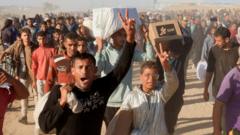In a bold statement, over 130 charities and NGOs have demanded the closure of the Gaza Humanitarian Foundation (GHF), a controversial entity funded by the US and Israel. The appeal comes in light of shocking statistics: since GHF's inception in late May, more than 500 Palestinians have lost their lives while attempting to gather essential aid, with almost 4,000 more sustaining injuries. These figures underscore the dangerous environment facing those seeking essential provisions in the war-torn region.
Major organizations, including Amnesty International, Oxfam, and Save the Children, have condemned the GHF operations, asserting that Israeli military and armed groups regularly fire upon Palestinians, hindering access to much-needed resources. However, Israel has denied these accusations, asserting that its military efforts focus on facilitating aid distribution while preventing interference from Hamas.
The joint statement released by the charity coalition exposed grave concerns about the GHF's disregard for established humanitarian practices. They argue the foundation's actions have forced approximately two million people into crowded, militarized zones riddled with danger. Reports from medics and the Hamas-run health ministry reveal nearly daily incidents where lives are lost in the pursuit of aid—signifying a breakdown of safety protocols traditionally associated with humanitarian work.
The GHF's aid model has sharply reduced the number of distribution points, greatly compounding the risk for those trying to secure assistance. Previously operating from 400 distribution centers during a temporary ceasefire, the current setup has restricted aid to just four military-controlled locations, drastically narrowing access. The NGOs’ statement illustrates the harrowing choices many Gazans now face, stating, "Today, Palestinians in Gaza face an impossible choice: starve or risk being shot while trying desperately to reach food to feed their families."
United Nations agencies have joined the chorus of condemnation against the GHF. Following these developments, UN Secretary-General Antonio Guterres described the aid system as "inherently unsafe" and criticized it for militarizing humanitarian efforts, thus endangering civilian lives. The Israeli military is reportedly re-evaluating safety measures for aid locations, but skepticism remains among the humanitarian organizations, who argue the GHF is not a viable response to the urgent needs of Gaza's population.
As the situation deteriorates, many families are reportedly unable to compete for food due to severe fatigue and despair, exemplifying the urgent humanitarian crisis evolving within Gaza. The conflict has raised critical questions about the nature of international aid and its implementation in conflict zones and continues to provoke discussions on how humanitarian efforts can be reshaped to ensure safety and dignity for those affected.


















